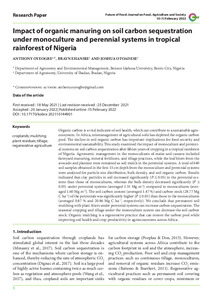Impact of organic manuring on soil carbon sequestration under monoculture and perennial systems in tropical rainforest of Nigeria
| dc.date.accessioned | 2022-03-11T11:10:34Z | |
| dc.date.available | 2022-03-11T11:10:34Z | |
| dc.date.issued | 2022-02-15 | |
| dc.identifier | doi:10.17170/kobra-202110144901 | |
| dc.identifier.uri | http://hdl.handle.net/123456789/13687 | |
| dc.language.iso | eng | eng |
| dc.rights | Namensnennung 4.0 International | * |
| dc.rights.uri | http://creativecommons.org/licenses/by/4.0/ | * |
| dc.subject | croplands | eng |
| dc.subject | mulching | eng |
| dc.subject | plant residues | eng |
| dc.subject | tillage | eng |
| dc.subject | regenerative agriculture | eng |
| dc.subject.ddc | 630 | |
| dc.title | Impact of organic manuring on soil carbon sequestration under monoculture and perennial systems in tropical rainforest of Nigeria | eng |
| dc.type | Aufsatz | |
| dcterms.abstract | Organic carbon is a major indicator of soil health, which can contribute to a sustainable agroecosystem. In Africa, mismanagement of agricultural soils has depleted the organic carbon pool. The decline in soil organic carbon has important implications for food security and environmental sustainability. This study examined the impact of monoculture and perennial systems on soil carbon sequestration after fifteen years of cropping in a tropical rainforest of Nigeria. Agronomic management in the monocultures of maize and cassava included farmyard manuring, mineral fertilizers and tillage practices, while the leaf falls from the avocado and plantain trees remained as soil mulch in the perennial systems. A total of 640 soil samples obtained in the first 15 cm depth from the monoculture and perennial systems were analyzed for particle size distribution, bulk density, and soil organic carbon. Results indicated that clay particles in soil increased significantly (P ≤ 0.05) in the perennial systems than those of monocultures, whereas the bulk density decreased significantly (P ≤ 0.05) under perennial systems (averaged 1.31 Mg m-3) compared to monocultures (averaged 1.60 Mg m-3). The soil carbon content (averaged 1.47 %) and carbon stock (28.77 Mg C ha−1) of the perennials was significantly higher (P ≤ 0.05) than those in the monocultures (averaged 0.87 % and 20.86 Mg C ha−1, respectively). Here, we conclude that permanent soil mulching with plant litters under perennial systems can increase the carbon sequestration, while the seasonal cultivation and tillage under the monoculture system decrease the soil carbon stock. Organic mulching is a regenerative and sustainable agronomic practice that can restore the carbon pool while improving soil health and crop productivity in Africa agroecosystems. | eng |
| dcterms.accessRights | open access | |
| dcterms.creator | Oyeogbe, Anthony | |
| dcterms.creator | Ehanire, Brayn | |
| dcterms.creator | Otoadese, Joshua | |
| dc.subject.swd | Nigeria | ger |
| dc.subject.swd | Tropischer Regenwald | ger |
| dc.subject.swd | Ackerfläche | ger |
| dc.subject.swd | Mulchen | ger |
| dc.subject.swd | Kohlenstoffbedarf | ger |
| dc.subject.swd | Bodenbearbeitung | ger |
| dc.subject.swd | Regeneration | ger |
| dc.subject.swd | Landwirtschaft | ger |
| dc.type.version | publishedVersion | |
| dcterms.source.identifier | eissn:2197-411X | |
| dcterms.source.issue | No. 1 | |
| dcterms.source.journal | Future of Food: Journal on Food, Agriculture & Society | eng |
| dcterms.source.volume | Vol. 10 | |
| kup.iskup | false | |
| dcterms.source.articlenumber | 454 |


